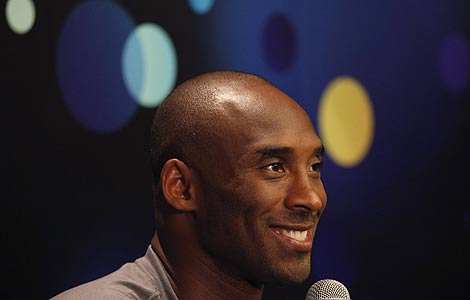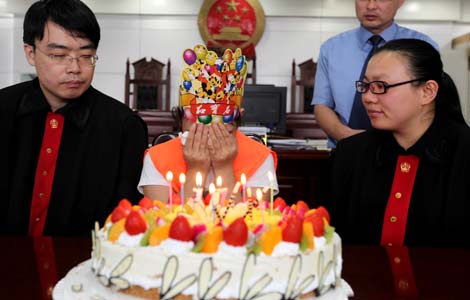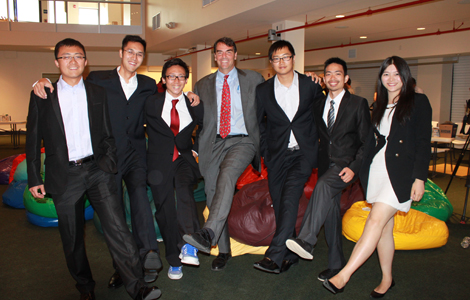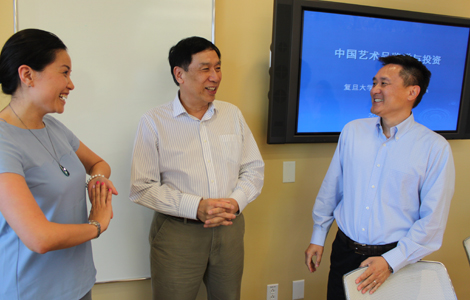Steinway to hits the right notes on the keyboard
Updated: 2013-08-05 07:18
By Chen Yingqun in Beijing and Cecily Liu in London (China Daily)
|
||||||||
Made to commemorate the Year of the Dragon last year, in collaboration with the Chinese antique expert Tian Jiaqing, the pianos were sold for 6.9 million yuan each at the China Guardian 2012 Autumn Auction in Beijing.
"There is immense potential in the Chinese market. This year, our piano sales have more than matched the forecasts. Although the current economic situation in China is not that ideal, we are optimistic on full-year targets. We believe that Chinese parents will not cut back on spending related to their children," Wei says.
She says Steinway pianos have been experiencing double-digit sales growth in China and believes the trend will continue for the next five years.
Wei says that Steinway's brand awareness is different in various Chinese cities and hence its marketing strategy also varies accordingly.
In bigger cities, the brand enjoys a high degree of recognition because top music schools often use the company's pianos, whereas in second- and third-tier cities, more efforts are needed on brand promotion because of the low visibility.
"What this means is that we need to focus and put more efforts into the second- and third-tier cities of China," Wei says.
"As China urbanizes rapidly, the demand for pianos in second- and third-tier cities will also grow rapidly. We anticipate huge opportunities in these markets."
To further expand into China's second- and third-tier cities, Steinway is focusing on training more piano technicians in these cities, so that customers turn to them for solutions.
She says that while it is not a major challenge to find local talent in these cities to repair pianos, it normally takes around three to four years for them to become master technicians who can repair Steinway pianos.
"When we form new partnership agreements with distributors, we also give them a lot of training and technical support, because our instruments are extremely specialized. We focus on training sales staff and technical staff, so they can provide a good service to customers," Wei says.
She says it takes a lot of skill and strategy to select good locations for stores in big cities such as Shanghai, Beijing and Guangzhou, so as to cover the entire population efficiently.
"We have to consider costs, target geographical areas and traffic flows, because the overall costs of running stores in big cities are very high," Wei says.
Currently, Steinway has about 10 stores in first-tier cities, including three stores in Beijing, two in Shanghai, one in Guangzhou and two in Shenzhen. The rest of its stores are in smaller cities, such as Zhongshan, Xi'an, Chengdu and Wuhan. Wei says Steinway is looking to expand store numbers in first-tier cities, and increase coverage of second- and third-tier cities.
At the same time, Steinway is also making inroads into building up people's perception of its brand. One way of doing so is to organize music-related events.
The company conducts a global piano competition for pianists aged below 17 years, once every two years. The latest competition attracted more than 4,000 pianists from China, with the winner being sponsored by Steinway to attend the International Steinway Festival in Hamburg.
"We hope to create a platform for young pianists to showcase their talent. The competition is not an end in itself, but rather a way to foster their interest in pianos," Wei says.
Steinway also hosts many music appreciation events across more than 20 Chinese cities, enabling a more general audience to appreciate the music.
"We also invite professional artists and musicians to give lectures about Steinway pianos, both on their physical appearance and sound, so that the average population can appreciate our pianos' beauty," Wei says.
She says Steinway considers these interactive events much more effective than advertising. "We advertise very little. Normally only in lifestyle magazines and luxury magazines. But it is hard to precisely target the right group of customers through advertisements," she says.
"Besides, it is best to appreciate our pianos by seeing, hearing and touching, because only this allows people to understand the craftsmanship that makes our pianos different from others."
Looking into the future, Wei believes that the Chinese will become increasingly sophisticated in their tastes, especially with regard to art and entertainment.

 Fly for adventure at US air show
Fly for adventure at US air show
 Kobe Byrant meets fans in Shenzhen
Kobe Byrant meets fans in Shenzhen
 New Zealand milk stokes fears
New Zealand milk stokes fears
 Yemen enhances security over embassies
Yemen enhances security over embassies
 Chinese heavy ground combat vehicles join drill
Chinese heavy ground combat vehicles join drill
 Police find kidnapped baby alive in Henan
Police find kidnapped baby alive in Henan
 Privacy 'needed' for young offenders
Privacy 'needed' for young offenders
 GPS devices to tackle food waste problem
GPS devices to tackle food waste problem
Most Viewed
Editor's Picks

|

|

|

|

|

|
Today's Top News
Overseas investors welcome to bid in Beijing
US extends closure of embassies
New Zealand milk stokes fears
Riding the clean energy boom today
Magnetic attraction for EU SMEs
Mugabe wins Zimbabwe presidential election
EU solar deal hailed as blueprint
Shanghai probes sex claims against officials
US Weekly

|

|






